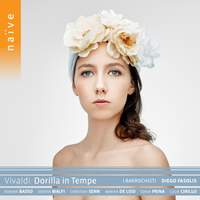Recording of the Week,
Vivaldi's Dorilla in Tempe from Diego Fasolis and I Barocchisti
Great news today for the many readers who've contacted me over the past eighteen months enquiring after Naïve Classique's pioneering Vivaldi Edition, which has been on sabbatical for a couple of years but returns in style here with a scintillating account of Dorilla in Tempe. (Interested parties can read my interview with the project’s artistic director Susan Orlando, who recently spoke to me about the evolution of the series itself and the compositional history of Dorilla).
 To channel Shakespeare's Polonius, it's a 'classical-pastoral' tale of nymphs and shepherds: Nomio (Apollo in disguise!) loves the princess Dorilla; Dorilla and Eudamia love the shepherd Elmiro; Filindo loves Eudamia...It's all really just a delightful excuse for two hours of glorious music - most of it by Vivaldi, but with contributions by Giacomelli, Leo, Hasse and Sarri, who were at the forefront of the fashionable Neapolitan opera scene in the 1730s.
To channel Shakespeare's Polonius, it's a 'classical-pastoral' tale of nymphs and shepherds: Nomio (Apollo in disguise!) loves the princess Dorilla; Dorilla and Eudamia love the shepherd Elmiro; Filindo loves Eudamia...It's all really just a delightful excuse for two hours of glorious music - most of it by Vivaldi, but with contributions by Giacomelli, Leo, Hasse and Sarri, who were at the forefront of the fashionable Neapolitan opera scene in the 1730s.
Between them, these four provide eight spectacular 'suitcase-arias' (a sort of vocal ‘bespoke tailoring’ designed to showcase the strengths of a particular singer, with a text generic enough to be copied-and-pasted into whatever opera they happened to be appearing in at the time!): hence the crucial dramatic passages are set to Vivaldi's own music, but many of the set-piece arias in which characters compare their emotional situation to a ship on a stormy sea or a hunter stalking his prey are the work of the guest-stars. The interpolations provide welcome variety without any stylistic jarring – indeed there are passages where Hasse and Giacomelli in particular seem to have rubbed off on Vivaldi himself.
Vivaldi's original line-up included a mixture of castrati and female voices, and here the five star-crossed lovers are cast with four mezzos and a contralto - but my initial misgivings about a possible lack of timbral variety were soon assuaged. Interestingly, it's the lower voices who portray the female characters, with Romina Basso's mellow, rounded timbre as Dorilla providing an effective contrast to Serena Malfi's brighter, more androgynous sound as her lover Elmiro, and the inimitable Italian contralto Sonia Prina (a veteran of the series) in her element as the feisty spurned lover Eudamia, dipping down to low Ds whilst everyone around her is busy showcasing their upper registers!
All five ladies cover themselves in glory when it comes to the vocal fireworks demanded by Vivaldi and his four accomplices: Lucia Cirillo (Filindo) impresses in a swaggering aria by Giacomelli ('Rete, lacci') towards the end of Act One, flicking up to staccato high Ds with ease, and Malfi's gorgeous account of Leo's 'Vorrei dai lacci' makes a thoroughly convincing case for a leading Vivaldi scholar's assertion that it qualifies as the most beautiful aria of the decade (see my interview with Ms Orlando for details!). For me, though, the emotional heart of the piece is Giacomelli's plangent 'Bel piacer saria d'un core', allocated to the lovelorn Apollo: at nearly eight minutes it's the longest aria in the score, but the effect is so spellbinding that time seems to stand still.
As the lone male voice in the cast, Christian Senn sings with authority as Dorilla's father Admeto, and is a match for the women in terms of vocal virtuosity: billed as a baritone, he descends to a stentorian low D in his marvellously nightmarish vision ('Dal orrida soggiorno') of the serpent which menaces his kingdom and must be appeased by the sacrifice of his daughter.
As Ms Orlando points out in our interview, the choral writing (all pure Vivaldi, this) is one of the most innovative aspects of the score. Rather than being consigned to a perfunctory 'all's well that ends well' closing ensemble, they play a key role throughout: the bucolic energy of the opening chorus (using the main theme of 'Spring' from The Four Seasons) gets things off to a terrific start, and their great Act One prayer to the Oracle has distinct echoes of Vivaldi's sacred music (not to mention foreshadowings of Mozart's writing in Idomeneo).
A hearty welcome back, then, for a much-loved series that's already done so much to bring major works by a major composer back into the light – the project is now approximately two-thirds of the way through, so here's to the remaining twenty-odd volumes!
Romina Basso (Dorilla), Serena Malfi (Elmiro), Marina de Liso (Nomio), Lucia Cirillo (Filindo), Sonia Prina (Eudamia), Christian Senn (Admeto); I Barocchisti, Diego Fasolis
Available Format: 2 CDs



